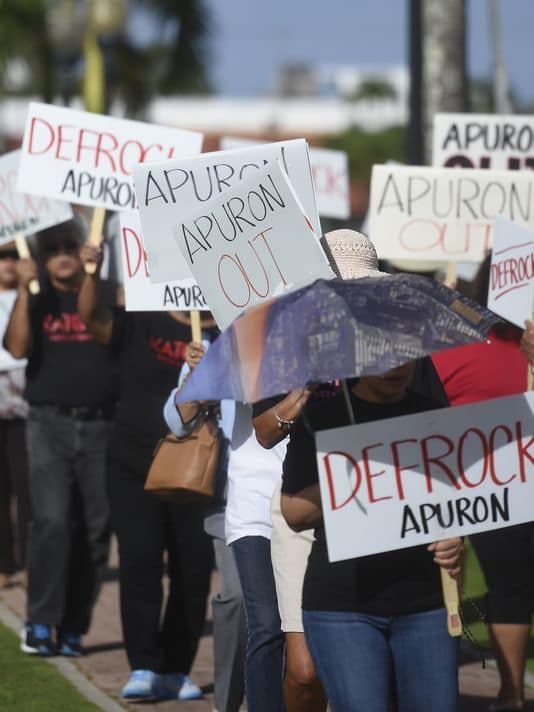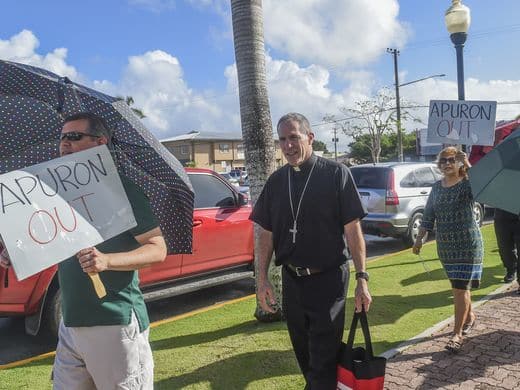
By Haidee V Eugenio
The Vatican has confirmed Archbishop Anthony S. Apuron’s canonical trial is ongoing, and some leading canon law experts said it could last for years.
Vatican policy dictates that only Rome can investigate bishops and archbishops who are accused of sexual abuse.
Besides undergoing a canonical trial in Rome, Apuron is also facing lawsuits filed in the Superior Court of Guam for allegedly raping and sexually abusing altar boys in the 1970s.
“This is new ground, as no bishop I am aware of, who sexually abused children, has ever finished a canonical trial,” Attorney Patrick J. Wall, a world-renowned expert on canonical trials and the Catholic clergy abuse crisis, said.
Wall is a former priest and Benedictine monk. He left the Catholic ministry after he felt he was used to help cover up other clergymen’s sex abuses. He has since been advocating for hundreds of clergy abuse survivors.
“Archbishop [Jozef] Wesolowski, Papal Nuncio to Haiti, died prior to the completion of his canonical trial in Rome,” said Wall, author of “Sex, Priests and Secret Codes,” a leading book on the 2,000-year history of sexual abuse in the Catholic Church.
Apuron, who has been Guam’s archbishop for nearly 31 years, turns 72 on Nov. 1. Under church law, bishops are required to resign at 75.
Attorney Jennifer Haselberger, also a leading canon lawyer based in Minnesota, said Apuron always has the right to request retirement or to tender his resignation before the conclusion of his canonical trial. She said the same is true of accused priests.
“However, if he believes himself innocent, he is unlikely to do so,” Haselberger said. “Moreover, with either of those resolutions, he would simply become emeritus archbishop, meaning that he retains all the privileges of an archbishop, and your diocese is still responsible for his financial support.”
On Oct. 31, 2016, Pope Francis named Coadjutor Archbishop Michael Jude Byrnes, of Detroit, Michigan, to succeed Apuron should Apuron retire, resign or is removed.
Archbishop Savio Hon Tai Fai said as early as 2015, the Vatican was already searching for an Apuron successor.
Hon, who temporarily led the Catholic Church on Guam when Pope Francis placed Apuron on leave on June 6, 2016,, said the early search was made because of concerns about Apuron’s leadership, allegations of sex abuse against him and his health problems.
Apuron is the first bishop who has served on Guam to undergo a canonical trial.
‘Unique’
Attorney Michael Pfau, a leading Washington State-based lawyer who has represented hundreds of clergy abuse survivors in multiple states, said the Guam situation is “unique” because its own archbishop is the one accused of abuse.

“Most cases involve a bishop accused of covering up the abuse of his priests,” said Pfau, who also handled cases involving abuse by the bishop’s close advisers.
Pfau has been working with the Guam-based law office of Dooley Roberts Fowler & Visosky LLP on clergy abuse cases.
The Holy See Press Office at the Vatican confirmed that Apuron’s canonical trial is ongoing. However, the office said it cannot release other information until after the trial is over, and referred further questions about the trial to the local archdiocese, the Archdiocese of Agana.
Byrnes, the first church official to state, in November, that Apuron’s canonical trial had started, just recently returned to Guam. The archdiocese said Byrnes arrived on Jan. 23.
“A canonical trial can certainly last for years,” Haselberger said. “Unlike with the civil courts, the judges and other officials will likely have other jobs, possibly in other parts of the world. So, the times in which they can assemble to proceed may be limited and cause delay.”
Haselberger previously served as chancellor for canonical affairs at the Archdiocese of Saint Paul and Minneapolis, but resigned in April 2013 in protest of the archdiocese’s handling of accusations of clergy sexual abuse.
In 2013, Haselberger established Canonical Consultation and Services LLC. She has served on independent review boards and is a noted speaker on issues relating to canon law and the Catholic Church.
Trial process
Wall provided a general outline of the canonical trial process, which begins with the complaint filed by the prosecutor or what the Catholic Church calls the Promoter of Justice, at the Congregation of the Doctrine of the Faith at the Vatican.
The Promoter of Justice is the Rev. Robert Geisinger, an American Jesuit from Chicago, Illinois, said Wall. Geisinger’s office, when contacted about the Apuron trial, declined to comment.
Apuron’s advocate will likely be a priest, and must be a canon lawyer, Wall said. Since 1991, Wall has consulted on more than 1,000 abuse cases and has been helping lawyers pick apart defenses that dioceses from around the nation have mounted.
Byrnes said in November that the initial phase of the canonical trial started and the tribunal had been established.
Wall said this means Apuron has the written charge from the Promoter of Justice. The Archdiocese of Agana so far has not released information about the specific charges Apuron is facing, other than saying they involve sexual abuse allegations.
“This is important, and can impact the possible outcomes. You may be aware of accusations, but that does not mean that those accusations are part of the trial. Getting clarity on what accusations he is facing would be most helpful,” Haselberger said.
The discovery phase of the canonical trial is where both sides will depose witnesses and interview experts, and this could take months, Wall said.
Outcomes
The discovery phase is followed by the trial and determination by a panel of three clerical judges, with penalties up to and including dismissal from the clerical state, Wall said.
“If a lower penalty such as ‘prayer and penance’ is imposed, then the Pope will need to assign him (Apuron) to a monastery or some other appropriate location,” he added.
Haselberger said there are ways for canonical trials to end without the verdict of the turnus, or the judges appointed to decide the case.
A verdict could be issued by extrajudicial decree, usually done when the penalty is only for a few years rather than perpetual, she said.
Or if guilt is evident, she added, the court could recommend that dismissal be issued by the Holy Father without prolonging trial.
“The latter circumstance does not admit of an appeal. The others do, during which the suspension of the sentence is held in abeyance. However, any precautionary penalties, those that the archbishop is under now, such as being absent from the diocese, would continue,” Haselberger said.
The Concerned Catholics of Guam and the Laity Forward Movement continue to advocate for Apuron to be defrocked or removed from clerical ministry.
“We worry that there may be some compromise or settlement solution being worked out with Apuron. We implore the Vatican officials not to let him get away without being seriously disciplined, and not rewarded,” said David Sablan, president of the Concerned Catholics of Guam.
Sablan said the only thing that should be worked out “is for Apuron to be removed from service to our archdiocese and laicized for the shame he has caused our Church.”
“He has lost the trust of the people of Guam who had always looked up to him for moral and spiritual guidance, only to now know it was all a ruse to forward his own personal agenda and to help his Neocatechumenal [Way] friends who are complicit in causing this division and mistrust within our church,” Sablan added.
Complete Article HERE!
